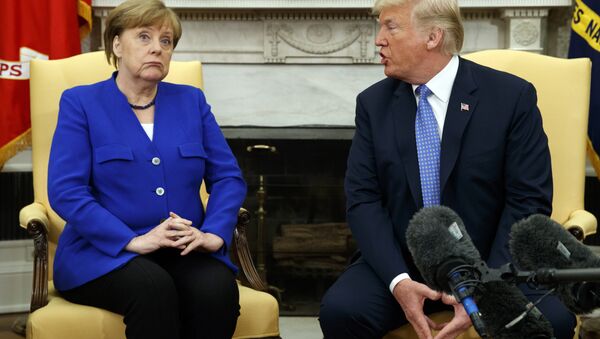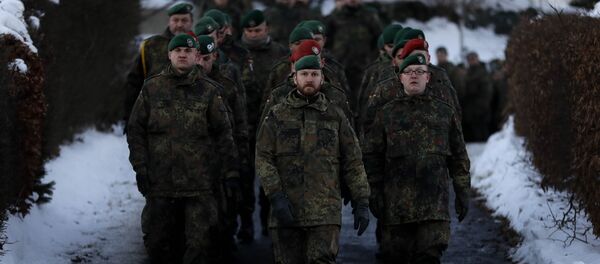Mr Grenell has criticised Germany for moving away from NATO's defence spending target of 2% of GDP. Germany's Finance Ministry earlier said that the country's defence spending will grow next year before dropping in 2022 and 2023. NATO countries are obliged to spend at least 2% of GDP by 2024.
The failure of European states to spend more on defence has prompted US President Donald Trump to threaten to pull out of the alliance. US military spending stood at $700 billion in 2018, more than twice the $280 billion of all European NATO states combined.
Sputnik discussed this with Dr Mark Gubrud, adjunct assistant professor in peace, war, and defence at the University of North Carolina.
Sputnik: What is the source of Germany's reluctance to meet the NATO spending target?
Dr Mark Gubrud: Well, I think that this has a great deal to do with their antipathy to the policy direction of President Trump, and he has been urging Germany and other European NATO states to increase their military spending for over the past several years. He's been urging that and making various statements talking about NATO dues which don't exist, and they're reluctant to take that course.
Sputnik: Would this actually have consequences for Europe's collective defence?
Dr Mark Gubrud: I don't see Europe's collective defence being seriously in danger at this point. There's talk about moving to a more European-centric defence structure for Europe that is, possibly even an EU defence force or some other arrangement outside of NATO for collective defence for Europe and that is a real possibility for the future, although, it remains to be seen whether that impulse will outlast the Trump administration.
READ MORE: NATO Press Office Refuses to Address Trump's Idea to Make Brazil 'Official' Ally
Again, it seems primarily to be a response to the direction that the President has been taking things. I don't think that would be a good development, although it's hard to see exactly what the outcome of that would be other than it's possible that we would see the world develop from a big three situation between the US, Russia and China, to a big four situation with the US, Russia, China and Europe as the fourth big power. But that's looking ahead decades into the future for that sort of situation to develop.
Prof on Budget: Insistence on Spending Important but NATO Is Political Matter
Sputnik: It's interesting you've just mentioned this European likely move towards creating a European collective defence force. Of course, that's been in the air for quite a while, we've heard that from the French leader as well, do you think this is just still a matter of discussion and it's perhaps going to happen in the very long time somewhere in the future?
Dr Mark Gubrud: I think it may begin happening in the near future, but it would only be a bureaucratic organisation initially because it takes time to build new defence forces, to reorganise troops operationally and build new interoperable systems and so on. So you wouldn't see all of that happening overnight. But there could be a move, there could be a dramatic unfolding of events to create a European defence force that indicates a substantive and permanent change in the relationship. But I'm not certain that this is going to happen. I would just say it's a roll of the dice at this point which way it goes.
Sputnik: Going back to the Germany-US situation regarding the spending targets, is Washington in a position to dictate Berlin how much the country should spend on defence?
Dr Mark Gubrud: Absolutely not. I think that Washington is able to put some pressure, and I think Berlin responded to that pressure initially, but now it's reversed course. I think there's been a political reaction inside Germany, people saying: "we don't want to go this way, we don't agree with this policy", and now it's taken the form of open defiance. They're saying they're not going to do it.
I think that's actually a positive development because there needs to be some pushback against Trump, this direction that Trump had been trying to take things it's just not going. You cannot within the NATO structure start demanding that other countries increase their defence spending dramatically, in order to reduce your own burden. It just doesn't have the ability to apply that kind of pressure, other than through outside channels, which is what Trump has been doing. But I don't think this has been productive. I don't think it's has been good for the relationship. I think the Germans are saying: "we've had enough of it".
READ MORE: US to Designate Brazil as Major Non-NATO Ally
Sputnik: Most recently President Trump tapped Brazil as a major non-NATO ally, what would be your assessment of this step?
Dr Mark Gubrud: It appears to be a political move. It's tied to the rise of Jair Bolsonaro in Brazil. Trump feels some affinity for [Bolsonaro]. Brazil is certainly an important player in the world today. Brazil is capable of producing modern weapon systems. It's capable of contributing substantially to collective defence, and we would like Brazil to be an ally of the United States, but it seems odd that at a time when a man who is just come to power in Brazil, who is currently regarded as an extremist, as potentially a fascist, and why are we suddenly strengthening ties to Brazil?
I think this is kind of a rash move. We should wait and see. The political questions, domestic policy, other issues besides defence shouldn't really prejudice any defence relationship between the US and Brazil; but I think it's not a good time to be strengthening our ties when this government has just come to power and we haven't really had a chance to see what it's going to do.
READ MORE: Bundestag Deputy Chairman Calls for Declaring US Envoy Persona Non-Grata
The views and opinions expressed by the speaker in this article do not necessarily reflect those of Sputnik.



